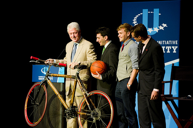At the 2012 Clinton Global Initiative University: ‘Talent is Universal: Opportunity is Not’
Rye Barcott coined the phrase “talent is universal; opportunity is not” in his 2011 book It Happened on the Way to War, which described his experience living in the Kibera slum of Nairobi prior to beginning his career in the US Marines in 2001. His experience with the young people there prompted him to start the organization Carolina for Kibera, which has become a leader in Participatory Development, a co-creative approach to development projects that engages local communities in projects that are appropriate for the specific constraints that they face.
Last weekend over 1,000 students from around the world gathered on the campus of the George Washington University in Washington, DC for the 2012 Clinton Global Initiative University. To get there, each of them had to make a commitment to action. From tracking cholera epidemics in Bangladesh, to reducing delinquency among disadvantaged young women in Arkansas through mentoring and coaching, to creating awareness about campus sustainability issues in Florida, these commitments focused on redressing the imbalance of opportunity that Barcott described in his book.
In his opening remarks, President Clinton introduced the key theme of the weekend; that we have a responsibility as global citizens to serve our communities, but that service is about more than just participation, it is about creating opportunities for others.
Clinton was then joined in a panel discussion (livestream video of the session is here) titled “The Power of Public Service” by Barcott as well as former Secretary of State Madeleine Albright, executive director of the Oruj Learning Center Sadiqa Basiri Saleem, President of the George Washington University Steven Knapp; and Usher Raymond IV, founder and chairman of Usher’s New Look Foundation. The panel discussion revolved around the related ideas of responsibility and action – that we have a responsibility to create opportunities for others, and that a bias for action is needed to make these opportunities a reality. Barcott’s advice to those who were waiting for the right opportunity to make a difference was to “pick something you care about, and start before you’re ready.” When asked what motivates her to continue her service to others, Albright’s response was she always strives to do things that are more interesting than the last thing she did, which she admitted is difficult when you have been Secretary of State!

Saleem, whose organization provides educational opportunities for women and girls in Afghanistan was asked what motivates her to continue to struggle against incredible odds and inequality, to which she replied “it is easy to be critical of something, but you have to ask yourself what you can do to change it.” Usher (pictured left), who undoubtedly got the warmest reception of the night, spoke about his desire to establish a legacy, to be remembered for ’more than just screaming fans.
With the attendees appropriately motivated, the following day’s content was focused on how to take these motivations to serve and turn them into scalable ideas. The first plenary session (Livestream video of the session is here) was on the topic of failure and how to effectively turn failure into a creative learning opportunity. “The Wisdom of Failure: Building a Culture of Creative Problem Solving” was moderated by Kathryn Schulz, author of “Being Wrong: Adventure in Margin of Error” who framed the conversation with the question ’If failure is the fundamental engine of our advancement, but society only rewards success, how can we turn failure into intelligent innovation?’
Joining her on the panel was Ashifi Gogo, CEO of Sproxil (see a NextBillion post on Sproxil here) and former CGIU award winner, of Biz Stone, co-founder Twitter; Founder of Buzzcar Robin Chase; and President of Echoing Green Cheryl Dorsey. Chase recounted an early failure with Buzzcar where they discovered some significant undercharging in one of their price plans. By being open with their early customers and explaining the reason why they needed to raise prices significantly, they managed to create some of the most loyal customers the company would ever have. Building on this theme, Stone described how, at Twitter, failure is something that they consider to be a mark of experience that looks good on a resume on the basis that a candidate that is too polished, or appears too bulletproof can lack authenticity. Embracing this vulnerability is a key step in failing intelligently, and failing quickly, both of which are hugely important to the resource constrained startup social ventures that many of the attendees are creating. (This week Twitter announced it was opening a small office in Detroit. Gogo spoke about the paradox that many of the attendees are typical overachievers and tend to struggle with trying to achieve perfection. He urged the audience to balance the desire to achieve perfection, with taking action quickly. Quoting Golfer Tom Watson, he advised “if you want to increase your success rate, double your failure rate.”
The remainder of the day consisted of a variety panels focused on specific aspects of social impact including poverty alleviation and global health, and many skills workshops designed to teach attendees how to fundraiser for their ventures, effectively leverage social media or how to monitor and evaluate progress toward their commitments.
A plenary panel titled ’Futurenomics’ (Livestream video of the session is here) focused on the challenging economic conditions that await students when they graduate, with high unemployment, high student debt and the uncertainty of pursuing their commitments full time. Chelsea Clinton moderated the panel and was joined by Tamara Draut, vice president of Policy and Programs at Demos; Cynthia Koenig, Founder and CEO of Wello (and a NextBillion guest contributor); Luis Moreno, president of the Inter-American Development Bank; and Founder of Navdanya Vandana Shiva. Draut spoke about the burden of paying for education, which has shifted from the public to the private while the means for private individuals to afford to pay for it has simultaneously been eroded. When asked how students like those in attendance who wanted to make a difference in the world could do so while also managing student debt, Koenig’s advice was to be creative, micro-budget, and be prepared to tighten your belt.
At the end of the day, President Clinton presented an award for the Outstanding Commitment to Panda Cycles, an initiative to manufacture and sell bicycles from bamboo to be distributed in Africa using a ’buy one, give one’ model.
As with many events of this nature, it is hard to appeal to everyone within the highly diverse audience, who had varying levels of experience and exposure. In some instances the panelists had such broad representation it was difficult for the conversation to progress beyond relatively shallow treatment of the topics. Two of the parallel panels I attended, however, left time in the agenda for the audience to discuss the topics in small groups and to report out on the results of those conversations. The small group discussions were, in keeping with the theme of action, framed around how each of the participants could use the ideas being discussed to further their own commitments.
It was in these interactions and the conversations that occurred in the space between formal sessions that I found the most valuable exchange of ideas, and my advice for future participants in CGIU would be to seek out as many opportunities as possible to engage with your peers as these are likely the people from whom you will learn the most.
- Categories
- Education, Impact Assessment
